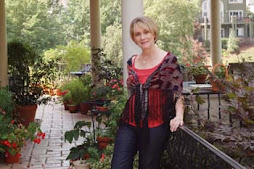
Melody Carlson has written what looks like forty novels for women and a plethora of books for young adults, teens, and non-fiction for adults and teens. She and her husband live in a cabin in the
MELODY: I’m so glad to be here, Patty.
PATTY: Do you recall any memories from your childhood that helped to shape you into a storyteller?
MELODY: From as early as I can recall, I loved stories and storytelling. I “published” my first book when I was about seven. It was a picture book that I illustrated. I typed the text on an ancient typewriter with a couple of missing keys, which I filled in by hand. I bound the “book” in silver foil wrapping paper, stapled it together, titled it “Kitten on the Keys” (about a cat who played piano)—and my mom saved it for all these years.
PATTY: She must have had a suspicion that you had some serious literary leanings.
MELODY: I continued to write stories for fun and when I was about ten, my mother had a “connection” with someone who I thought was really going to publish my works. I still remember the rainy night we drove to meet this woman (it seemed a long ways) and I was so excited, imagining I was going to a real publishing house, but when we got there it was just a mobile home and the woman “published” her books in a way very similar to my seven year old attempt. I was devastated and probably thought my writing career was over.
PATTY: Not too many children have to face the hard knocks of publishing. But you didn’t stop, obviously.
MELODY: I continued to write—somewhat secretly. Because, yes, classmates thought I was weird. My saving grace was that I was also fairly athletic and somewhat bossy so I also had their respect, but if they wanted to get me they’d use words like “brainy,” which drove me nuts. And I was further humiliated when I won the book reading contest (for reading the most books) and my friends had been betting that Laurie Lund (a real bookworm, who wore glasses and never played sports) would win. I couldn’t believe I’d out-read her—and even though I liked the prize (a chess set) I was thoroughly embarrassed and tried my best to play it down.
PATTY: When did you see a glimmer of hope that you might become a writer?
MELODY: In sixth grade, a teacher and mentor talked me into starting a newspaper. We were the Brattain Buccaneers and the paper was called the BuccaNews. Naturally I was the editor—who else would want this thankless job? Unfortunately, my classmates didn’t have the interest (or maybe they lacked the skills or nerve) so I ended up writing, illustrating, and printing (on a mimeograph machine that I cranked by hand) most of the paper myself. I even used pseudonyms to make it look like there were other writers for the articles, jokes, puzzles, etc.. And I’m sure I probably delivered the paper too.
PATTY: Small beginnings are not to be despised, though.
MELODY: But my “literary life” changed drastically in junior high when I got worried about appearing too nerdy (plus I discovered boys). That was when writing was done clandestinely and reading was set aside for a few years. The benefit for this sacrifice was that I fully participated in “life” and this is probably why I write the way that I do for teens—because I remember what it was like. But I also remember feeling like an imposter (an academic nerd impersonating a cheerleader). And I even let my grades slip so I wouldn’t appear too smart.
PATTY: I remember the pressure to “let up.”
MELODY: Although it bothered me that I was being phony, it seemed the best way to survive adolescence. Thankfully I became a Christian in high school and that helped me to live a more authentic life—whether my peers liked it or not.
PATTY: If you don’t mind sharing, what sort of emotional loads did you have to carry?
MELODY: Another way I felt different as a child was that my parents divorced when I was very young. Growing up in the sixties in a “broken home” was not the norm. However, my mom (who returned to school for her teaching degree) exposed me to a lot of things I might’ve otherwise missed. I loved going to the museums on campus, music events, art lessons, and I even took ballet.
PATTY: You were blessed with a mother who compensated.
MELODY: What I missed out on in the typical “Ozzie and Harriet” lifestyle (which I always secretly envied) was replaced with experiences that probably helped broaden me as a writer. Plus, because we were relatively poor and lived in a poor neighborhood, I saw some slices of life that made me think more deeply and ultimately influenced my writing. And although I had numerous teachers who encouraged me in regard to writing, I never took their praise seriously.
PATTY: When I teach writing, I find this true of so many young people. They’re more interested in presenting a face to their peers that helps them blend into the herd rather than celebrating and honing their talents.
MELODY: Writing came so easily to me that I didn’t recognize it as anything very special and I never believed that I had the skill to become a “real author” or publish a “real book.” That was for someone else—someone famous or talented or some other mysterious ingredient that I lacked. Looking back, I realize that these teachers were seeing something that I had missed. I’m sure I stood out as unusual and, although I wasn’t always happy with who I was, I’m thankful now that God made me the way he did. And, all these published books later, I have no doubts that he designed me to be a writer.
PATTY: I have no doubts either, Melody. If you’d like to read a bit more about Melody’s life in the
Tomorrow you will meet a new novelist who writes spec fiction. Karen Harrington will share with us her own stories of teenage angst and coming-of-age uniquely fitted for her future life as a storyteller. You won’t want to miss Friday’s Words to Go!








